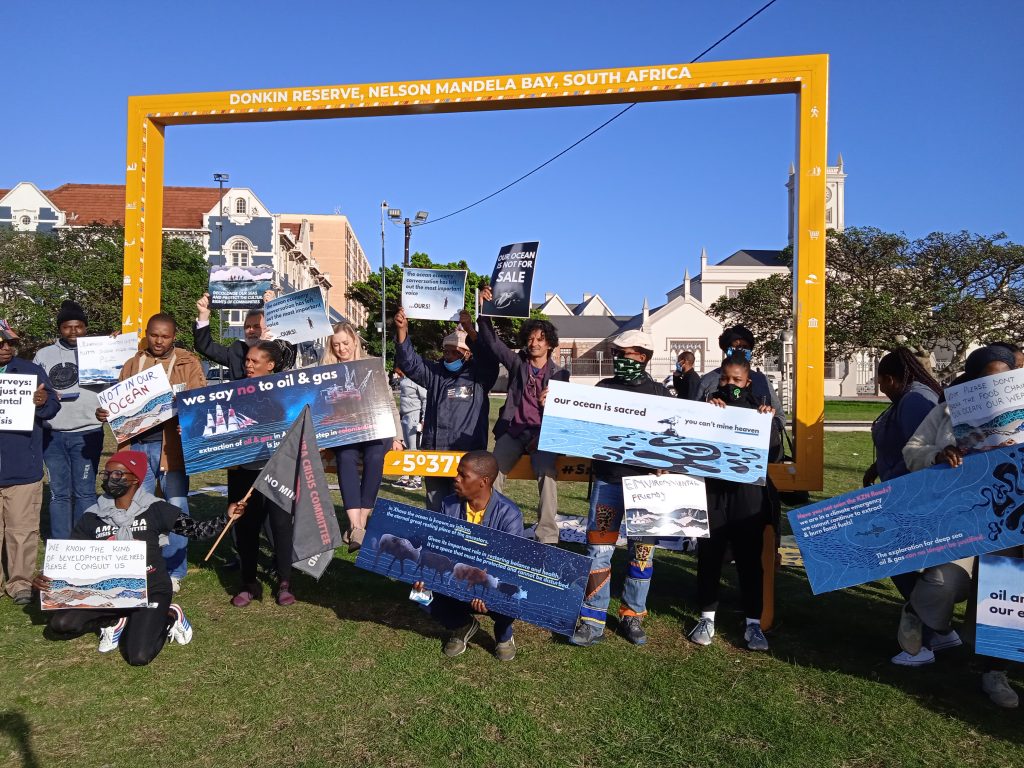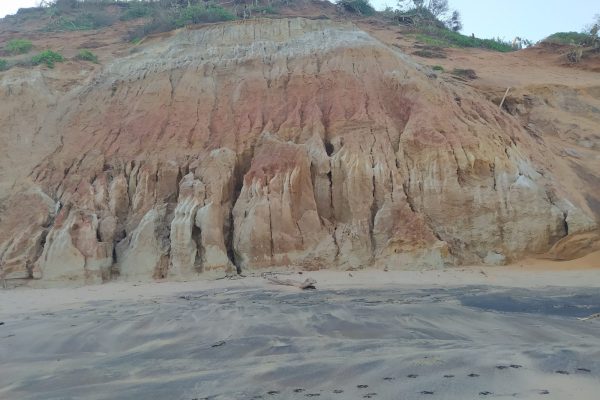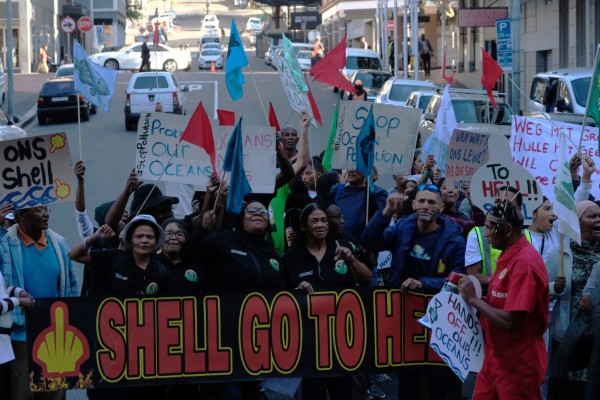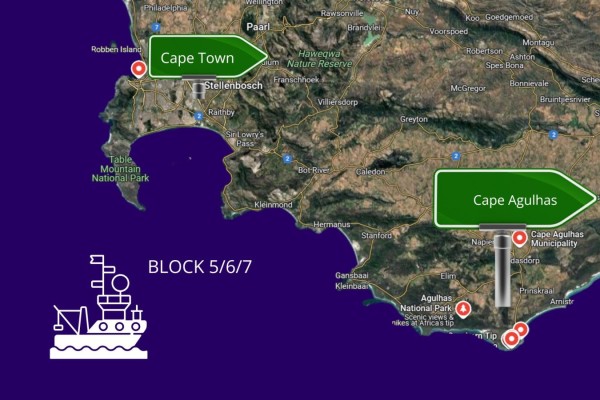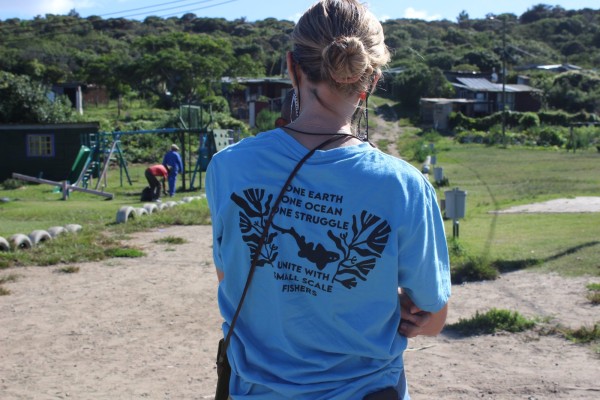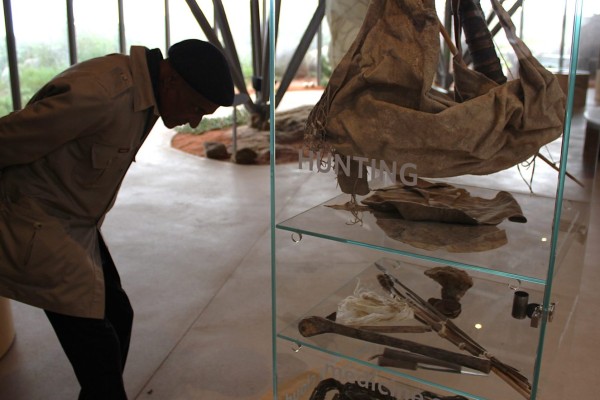22 November 2022, South Africa: On Monday 28 November in the Gqeberha High Court, the Minister of Mineral Resources and Energy, Impact Africa and Shell (the appellants) will argue why they should be granted leave to appeal the Makhanda High Court judgment of 1 September 2022, which found that the authorisation by the Minister to allow Shell to conduct seismic surveys off the ecologically sensitive Wild Coast of South Africa was unlawful.
The leave to appeal application will be challenged by coastal communities and fishers (including the Amadiba and Dwesa-Cwebe communities and small-scale fishers from Hobeni, Port St Johns and the Kei Mouth), Sustaining the Wild Coast, All Rise, Natural Justice and Greenpeace Africa, represented by the Legal Resources Centre, Richard Spoor Attorneys and Cullinan & Associates.
On 1 September 2022, the Makhanda High Court handed down judgment in part B of the legal challenge to Shell’s seismic surveys off the Wild Coast of South Africa, which put a stop to the planned seismic surveys and found that the process through which the decision to grant an exploration right was made, was procedurally unfair on several grounds including failure to consider the communities’ spiritual and cultural rights, their right to food, the potential climate change implications, and more.
The ruling, which caught international attention, was considered a huge victory for the communities along the wild coast, their civil society partners, and the planet.
The authorisation for the exploration right was granted by the Minister on the basis of an Environmental Management Programme (EMPr) developed by Impact Africa in 2013 in terms of the Mineral and Petroleum Resources Development Act (MPRDA). Impact Africa did not undertake an environmental impact assessment, or obtain an environmental authorisation in terms of the National Environmental Management Act (NEMA) before it commenced the survey.
The decision to provide authorisation was set aside as there was no consultation with the affected communities who live on the coastline and who depend on the ocean to sustain their livelihoods. Further, the court held that consultation with traditional leaders, and not with wider communities, was insufficient to be considered meaningful engagement.
Additional grounds for the court’s decision included the Minister’s failure to take into account climate change and the desirability for oil and gas development in South Africa, given the climate emergency we find ourselves in. The court further held that the Minister’s failure to consider the Integrated Coastal Management Act, climate change and the cultural rights and spiritual beliefs of the affected coastal communities, constituted a failure by the Minister to consider all relevant factors when making the decision to provide authorisation.
Shell, Impact Africa and the Minister have now applied for leave to appeal.
This will be heard in the Gqeberha High Court on Monday, 28 November 2022.
Application for Leave to Appeal
Shell, Impact Africa and Minster Mantashe are applying for leave to appeal against the entire judgment.
In order for leave to appeal to be granted, an appellant needs to satisfy the following criteria:
- That there is a reasonable chance of success; or
- There is a compelling reason as to why the appeal should be heard.
Shell, Impact and the Minister are seeking to appeal the judgment on the following grounds:
- The failure by the communities and their partners to exhaust their internal remedies which would have required lodging an appeal with the Minister, as is required under the Promotion of Administrative Justice Act (PAJA) prior to approaching a court.
- The applicants were unduly delayed in bringing the application for review, and were therefore out of time in terms of PAJA.
- The consultation process carried out was not flawed and complied with the requirements under the MPRDA.
- The court erred in its findings in taking into account considerations such as the precautionary principle.
- The harm to the applicants spiritual and cultural rights are of no bearing in a review.
In response, the communities and their partners believe that the Makhanda High Court was correct in ruling that the applicants did not need to exhaust their internal remedies, given the public statements made by the Minister referring to them as “apartheid and colonialism of a special type” arising from their opposition to oil and gas exploration.
The applicants also submitted that there was no undue delay, as they were only made aware of the seismic survey in November 2021. The communities live in areas where newspapers advertising the survey did not circulate and they were not involved in the defective consultation process whereby traditional leaders were consulted.
The Court considered the expert evidence submitted by the applicants that not enough is known about the cumulative impacts of seismic surveys, and consequently found that the Minister should have applied the precautionary principle. The communities and their partners agree that the precautionary principle should have been considered when granting the authorisation.
The appellants contend that the Court was wrong to consider the impact to the applicant communities’ spiritual and cultural rights and livelihoods in the granting of the exploration right. This is a misdirection of the law and unduly dismissive of the constitutionally-protected rights of the applicants. The Court was correct in ruling that the Minister, when deciding to award the exploration right to Shell, would have benefitted from a more holistic approach, including taking into account the cultural rights and spiritual beliefs of the applicants.
The Cross Appeal
The communities and their partners believe that the appeal against the judgment of the Makhanda High Court has no prospects of success, however the case does raise important issues which are of great public interest.
Whilst the judgment was a positive one for the communities and their partners, the court declined to make a ruling on the declaratory relief which the coastal community applicants had sought. In this case, a declarator was sought stating that Shell needed an environmental authorisation, as required under NEMA, before commencing with the seismic survey. Shell had argued that, because the exploration right was granted prior to the December 2014 enactment of NEMA’s listed activities requiring environmental authorisation for exploration activities, they did not need an environmental authorisation and their environmental management programme was sufficient, despite the renewal of the exploration right taking place after the enactment of NEMA’s listed activities.
The Court declined to rule on the declarator as they had set aside the exploration right and, therefore, had concluded that the applicants had obtained a substantial part of their relief. However, the applicants believe that the declarator plays an important role in the advancement and protection of constitutional rights. It will set higher standards for consultation with communities and provide for a full consideration of all the impacts of seismic exploration on the environment, as well as people’s livelihoods and human rights.
In the judgment, the court recognised the centrality of this case to Section 24 of the Constitution which provides for the right to a healthy environment. The court further recognised the need to strike a balance between the right to a healthy environment and socio-economic development. The applicants believe the declaratory relief sought goes to the heart of this balancing exercise. This is because it will provide clarity on the scope and nature of the obligations under NEMA as well as the MPRDA, which will then give effect to Section 24 of the Constitution.
ENDS

